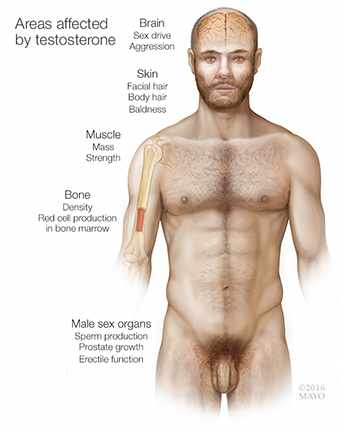
DEAR MAYO CLINIC: I’m a 56-year-old man without any health problems. Recently, I’ve noticed I don’t have the energy for physical activities that I used to. Working in the yard, riding my bike and even just doing jobs around the house all wear me out much faster now than even five years ago. My sex drive is lower, too. I see ads all the time for testosterone therapy and what a difference it can make for men my age. Should I give it a try? Is it safe?
ANSWER: Recent research shows that testosterone therapy can be useful in some cases, but it’s not right for all men. To see if it could be helpful for you, start by making an appointment with your doctor to have your testosterone level checked.
Testosterone is a hormone produced primarily in the testicles. Testosterone helps maintain men’s bone density, fat distribution, muscle strength and mass, red blood cell production, sex drive and sperm production. For most men, testosterone peaks during adolescence and early adulthood. Then, as men get older, testosterone levels gradually fall.

If testosterone drops below a certain level, it can cause symptoms. Fatigue and low sexual interest are common. Some men also see changes in beard and body hair growth. Muscle wasting and a decrease in muscle strength can be a result of low testosterone, too.
Your doctor can use a blood test to check your testosterone level. Even if your testosterone level is found to be low, though, testosterone therapy is not automatically the answer. It’s also important to determine any potential causes or associated conditions of low testosterone before moving forward with treatment.
In some cases, medical conditions can contribute to low testosterone, including thyroid problems, obesity, obstructive sleep apnea, depression and excessive alcohol use. Some medications may cause testosterone levels to drop, as well.
As part of your evaluation, your doctor should review your current medications and check for underlying medical problems that could be contributing to your symptoms. If your testosterone is low and a medical condition is identified, treatment for that disorder may be all you need to bring your testosterone level back into the normal range. A change in medications also could make a difference.
If low testosterone isn’t due to medication or a medical problem, then taking prescription testosterone replacement may be beneficial. Numerous studies have found that testosterone may be helpful for men experiencing symptoms as a result of low testosterone. In many cases, however, the effects are modest. In men with normal levels of testosterone, taking prescription testosterone generally has no effect for most symptoms.
In addition to easing symptoms of low testosterone, prescription testosterone may have other benefits, including reducing fat mass, improving lean muscle mass, strengthening bones and improving insulin sensitivity.
Taking prescription testosterone does have risks. It may cause production of more red blood cells (a condition known as polycythemia); increase prostate-specific antigen, or PSA, in the blood; enlarge breasts; or reduce sperm production. Testosterone therapy does not cause cancer, including prostate cancer. If your doctor recommends that you take testosterone, you need regular blood tests to make sure the prescribed dose is correct, as too much testosterone potentially can lead to other medical problems.
Although most studies suggest that testosterone therapy does not increase the risk of heart attacks or stroke, and that it may even be protective in some cases, there is not enough information to prove its safety conclusively among elderly men with cardiovascular risk factors.
To see if testosterone therapy may be right for you, make an appointment to see your doctor and assess your symptoms. He or she can do a thorough evaluation and help you decide what, if any, treatment you may need. — Landon Trost, M.D., Urology, Mayo Clinic, Rochester, Minnesota







